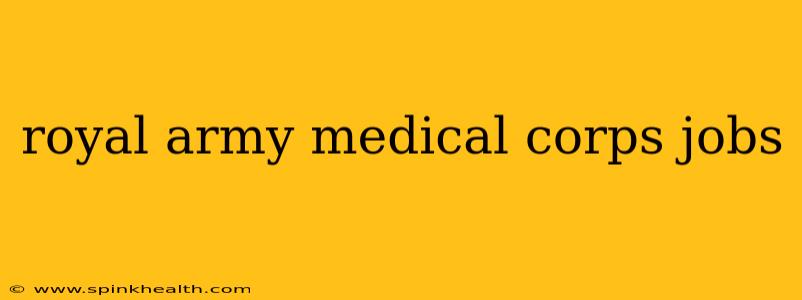The Royal Army Medical Corps (RAMC) isn't just a job; it's a calling. It's a chance to combine your medical expertise with a deep sense of service, contributing to the well-being of soldiers and civilians alike in dynamic and challenging environments. But what exactly does a career in the RAMC entail? Let's unravel the mysteries and explore the diverse roles available.
Imagine this: You're not just treating patients in a sterile hospital environment. You're providing critical care in the field, under pressure, using your skills to save lives in the midst of chaos. That's the essence of the RAMC experience. The Corps offers a wide spectrum of opportunities, from battlefield medicine to sophisticated hospital care, both at home and abroad.
What are the different roles within the Royal Army Medical Corps?
The RAMC is a multifaceted organization, offering roles for medical professionals of all levels and specialties. This isn't just limited to doctors; it encompasses a vast range of support staff vital to ensuring the health and well-being of the army. Let's explore some key areas:
Doctors (Medical Officers)
This is perhaps the most recognizable role within the RAMC. Medical Officers are responsible for providing a wide range of medical care, from primary care to specialized surgery. Their duties can range from treating minor injuries on a training exercise to performing complex operations in a field hospital. The experiences are varied and challenging, demanding both clinical excellence and adaptability.
Nurses (Nursing Officers)
Nursing Officers are the backbone of medical care within the RAMC. Their roles are crucial, encompassing everything from bedside care to managing wards and assisting in surgical procedures. They often work closely with Medical Officers, providing essential support and care. The demanding nature of military operations requires nurses to be highly skilled, resilient, and quick-thinking.
Other Allied Healthcare Professionals
The RAMC extends far beyond doctors and nurses. A wide range of allied healthcare professionals, including physiotherapists, dentists, pharmacists, and paramedics, are crucial for providing holistic care to soldiers. Each specialty offers unique challenges and opportunities to contribute to the overall health and well-being of the armed forces.
Support Staff
The efficient functioning of the RAMC depends heavily on the support staff who work tirelessly behind the scenes. These roles range from administrative staff to medical technicians, each playing a critical part in ensuring the smooth delivery of healthcare services.
What are the benefits of joining the Royal Army Medical Corps?
A career in the RAMC offers more than just a job; it's a rewarding path with numerous benefits:
- Making a Difference: You'll be directly contributing to the well-being of soldiers and, often, civilians in need, both domestically and internationally.
- Professional Development: The RAMC offers unparalleled opportunities for professional growth and development, with access to advanced training and specialized skills.
- Travel and Experience: You'll have the chance to work in diverse locations, both at home and abroad, gaining invaluable experience and broadening your horizons.
- Competitive Salary and Benefits: The RAMC offers competitive salaries, benefits, and pension schemes.
- Personal Growth: The demanding nature of military life fosters personal resilience, leadership skills, and adaptability.
How do I join the Royal Army Medical Corps?
The application process varies depending on your profession and qualifications. Generally, it involves meeting specific academic and professional requirements, passing fitness tests, and undergoing a rigorous selection process. Detailed information can be found on the official recruitment website for the British Army.
What are the training requirements for RAMC jobs?
The training requirements vary significantly depending on your chosen role. Medical officers require a medical degree and completion of postgraduate training, while nurses will need appropriate nursing qualifications. Allied healthcare professionals will need qualifications relevant to their chosen specialty.
What are the career progression opportunities within the RAMC?
The RAMC offers substantial opportunities for career progression, with the potential to advance to senior medical and leadership roles within the Corps.
The Royal Army Medical Corps isn't just about treating injuries; it's about providing comprehensive healthcare, fostering resilience, and ensuring the well-being of soldiers. If you're a medical professional seeking a challenging, rewarding, and impactful career, the RAMC may be the perfect path for you. It's a chance to serve your country while making a real difference in the lives of others.

